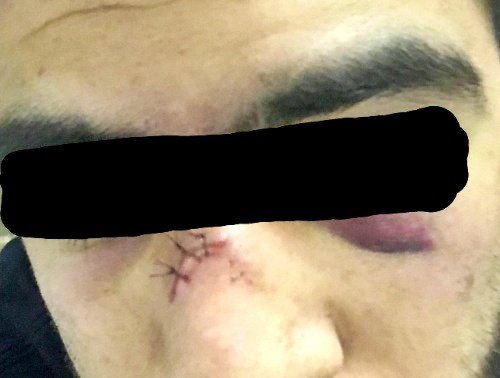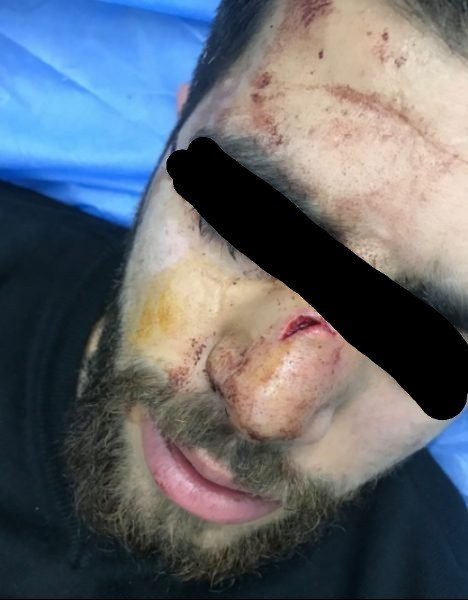I need asylum and I can prove that I do, but they took all my papers and my belongings
| 20.12.2020 | Orestiada/Karakasim | josoor | 41.5141886, 26.5937541 | Greece | Turkey | yes | yes | yes | yes | no | no | 3 - 60 | 70 | Afghanistan, Syria, Iraq, Jordan, Somalia, Cote d'Ivoire | detention, no translator present, denial of access to toilets, denial of food/water | 10 | beating (with batons/hands/other), sexual assault, theft of personal belongings, reckless driving | 2 officers in Greek police uniform, 3 officers in black uniform with blue armbands and the EU flag, at least five officers dressed in black clothes wearing balaclavas |
The respondent is a 24 year old man from Jordan. He had crossed the border from Turkey to Greece together with two men from Syria and Iraq. On December 18th, the three of them were walking in Kavala when they saw two police officers. The respondent and the two others tried to run away but were too exhausted after many long days of walking so eventually they got caught. The officers, who were wearing green uniforms, called other officers. The respondent describes how he and the others tried to talk to the two officers while waiting for the others to arrive, but the officers were only speaking Greek and didn’t seem to care to listen. The respondent frequently told them that all three of them wanted to apply for asylum, but they were always ignored. The respondent had all the relevant papers with him to prove his persecution in Jordan, the original papers in Arabic and translations into English and Greek. Three more officers arrived shortly after, they were wearing black clothes with the EU flag on a blue armband on their arms. The respondent does not recall reading the word Frontex or seeing another flag than the European one. The three officers took everything from the respondent and his friends, including all the respondents papers and the 1.500 USD he had with him, all their phones and even their jackets. They then ordered the group not to move and hit them repeatedly, particularly whenever they tried to say anything. Then, the officers ordered the respondent and his companions to get into a car and drove them to a detention site. The ride took 4 or 5 hours. They were taken into a small, dirty room where between 70 and 80 people, among them many women and children, were already detained when the respondent and his friends were brought in. The respondent describes the treatment at the detention site as incredibly brutal and humiliating. Upon their arrival they were beaten. During the detention, which lasted the whole day, the respondent says:
“Two officers frequently came into the room just to randomly hit everyone with their batons.”The respondent also recalls how the officers sexually harassed the women, male officers frequently conducting body searches and anyone who complained about it got beaten. According to the respondent, there was no toilet and no access to water or food. After nightfall, several officers dressed in black and wearing balaclavas entered the detention site and told the whole group to get out. The respondent tried to ask for asylum again, explaining
“I need asylum and I can prove that I do, but they took all my money and papers, my power bank and my belongings”in response, one of the officers hit the respondent on his nose with a baton, from which the respondent suffered a wound and started bleeding heavily. The officers took the group of 70-80 to the river by car. The respondent cannot say how long the ride was. The group was then divided into smaller groups by the “masked men”. The respondent was still bleeding so much that at this point he felt he was about to lose consciousness. His deteriorating condition at this point is also the reason why he cannot recall many details of this part of the pushback. Subsequently, the smaller groups were ordered to embark an inflatable dinghy and were driven until the middle of the river. The respondent describes how freezing the water felt and that they just tried their best to quickly make it to the other side and start walking as not to die of hypothermia. The point of pushback was close to Karakasim. Eventually, the respondent found a taxi and asked to be taken to Istanbul but the driver insisted on taking him to the hospital in Edirne instead. The respondent was afraid to seek medical care as he did not have any papers or money anymore, but he was able to call a friend who came to meet him at the hospital where the wound on his nose was stitched with three stitches and several other wounds on his head were treated. [caption id="attachment_16637" align="alignnone" width="500"]
 Injuries after treatment[/caption]
[caption id="" align="alignnone" width="468"]
Injuries after treatment[/caption]
[caption id="" align="alignnone" width="468"] Injuries before treatment[/caption]
Injuries before treatment[/caption]
